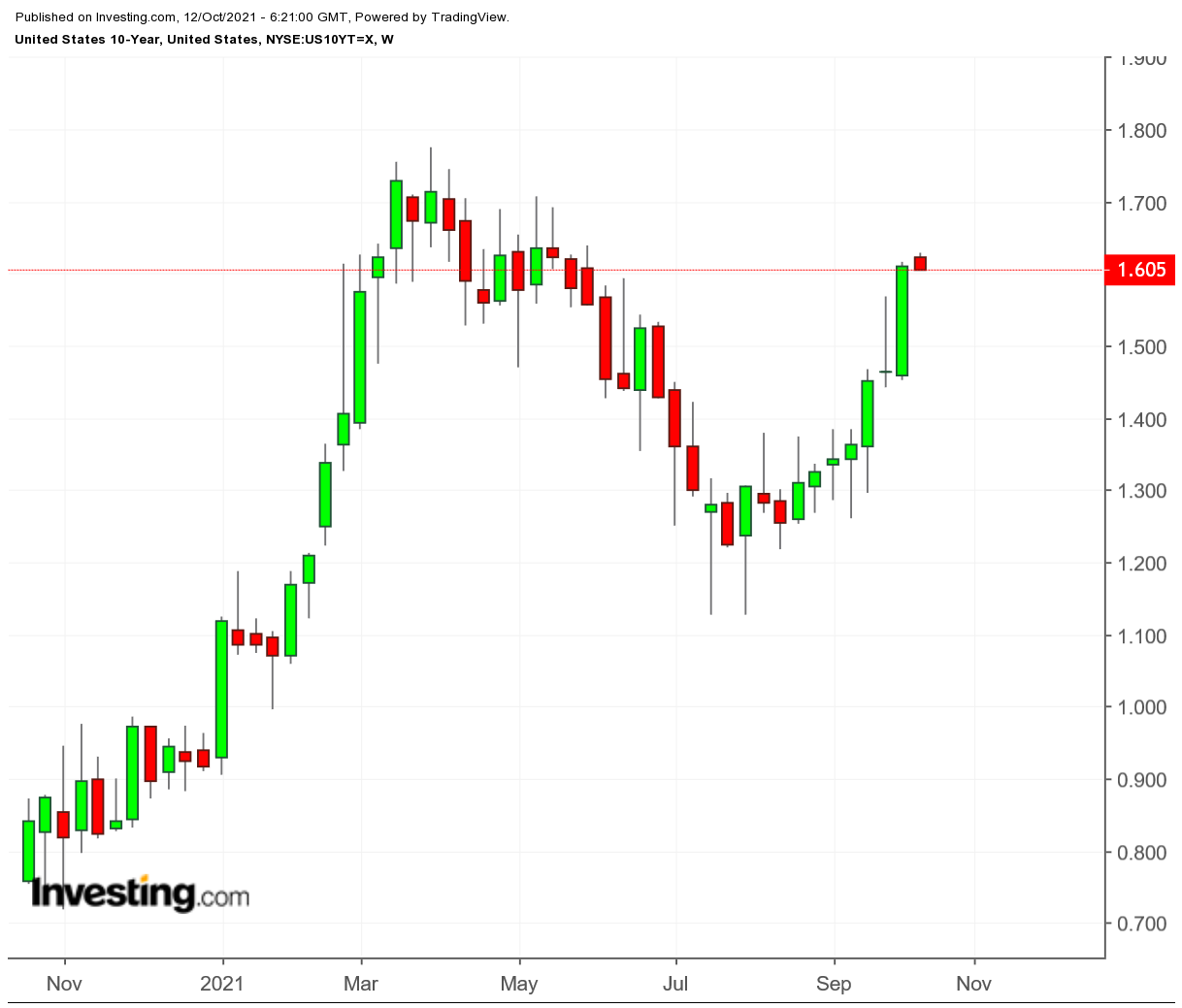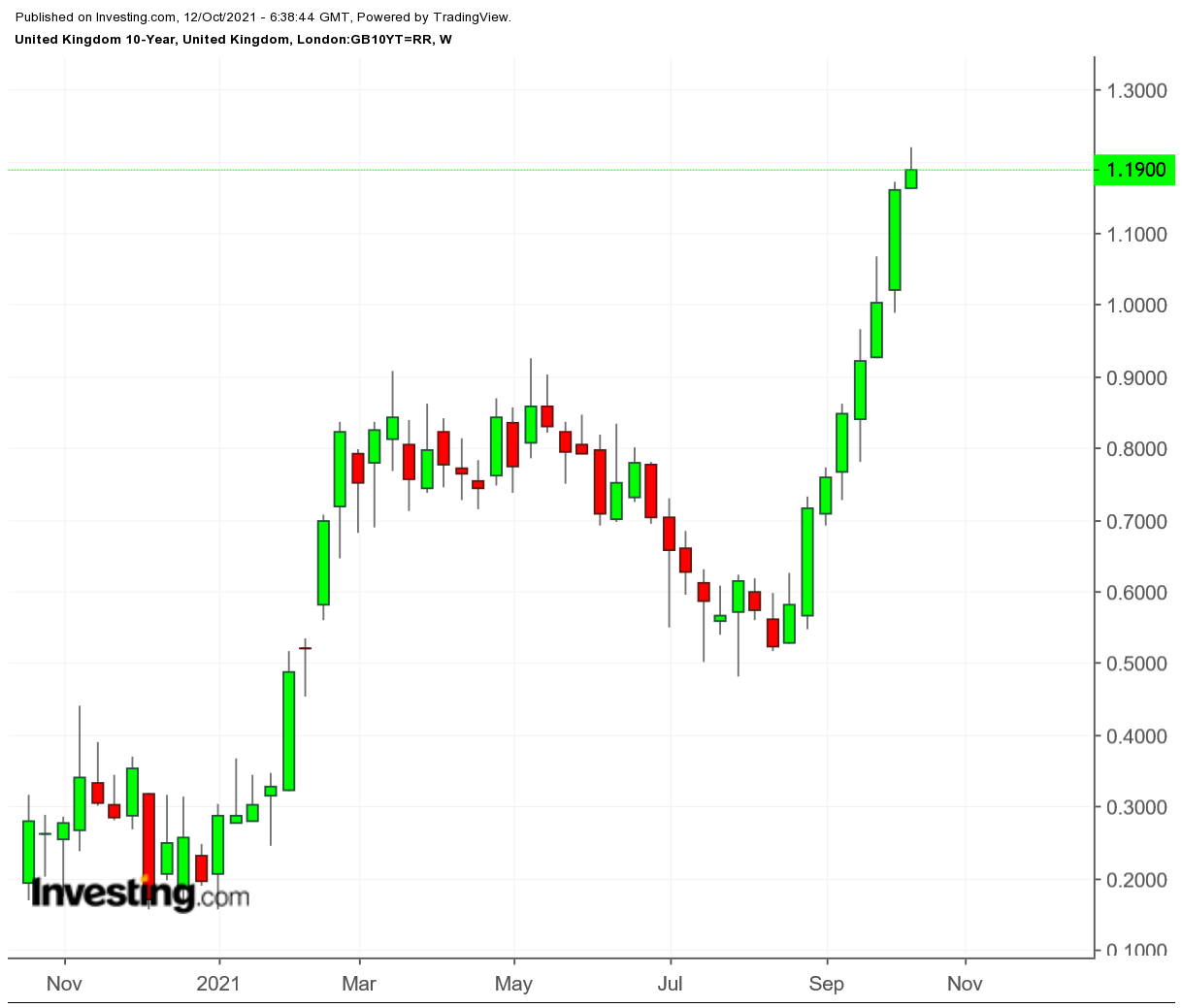Yield on the benchmark 10-year Treasury note shot up above 1.6% on Friday after a disappointing jobs report which investors decided wasn’t disappointing enough that it would stop the Federal Reserve from announcing a reduction in its bond purchases in November.

US bond markets were closed on Monday for a holiday, but Treasury futures showed continued weakness. Nonfarm payrolls increased by only 194,000 in September, less than half the 500,000 forecast. The only consolation was that the headline unemployment rate declined to 4.8%, compared to the forecast of 5.1%.
Wages rose 0.6% on the month, and 4.6% on the year. Former Treasury Secretary Steven Mnuchin warned on Thursday that overspending by the Biden administration could spur inflation in the coming months. Stating at a Bloomberg conference:
“I do worry that this will be ongoing inflation, and we could easily end up with 3.5% 10-year Treasuries, which again just increases the cost of the national debt and creates budget issues.”
On cue, the yield rose from 1.55% following Friday’s jobs report. Mnuchin has gone back to private equity investing after serving four years as head of the Treasury Department, and has raised $2.5 billion for his new Liberty Strategic Capital.
Mnuchin, who was also a movie producer, has to his credit that he survived four years in President Donald Trump’s cabinet. A report on Sunday further added to his credibility by claiming he intervened to block the president from appointing his daughter Ivanka to head the World Bank in 2019. The nod instead went to David Malpass, a Treasury Department veteran.
Inflation Affect On Global Yields; Made Worse By Energy Woes
Inflation has become a global worry. Yield on Japan’s 10-year government bonds rose half a basis point on Monday to 0.85% as they followed US Treasury yields higher.

In Europe, government bonds continued to fall in price, boosting yields. Yield on UK bonds rose 5 basis points after Bank of England officials warned over the weekend about inflation risk.
The rise in UK yields pulled up those in the eurozone. Yield on Germany’s benchmark 10-year bond rose 2.5 bps to minus 0.108%, marking a rise of 20 bps in a month as it nears a positive yield.
European Central Bank chief economist Philip Lane played down the potential impact of inflation on yields, saying the current rate is not an automatic trigger for monetary action. Nonetheless, money market futures indicate investors anticipate an ECB rate increase by December 2022, or even by next September.
Analysts see supply shortages and rising energy demand as driving inflation. US crude oil prices closed above $80 a barrel for the first time since 2014. Brent crude, the benchmark for European oil, closed even higher, above $83, as some economists forecast a price of $100 a barrel.
Energy shortages are contributing to rising inflation. Natural gas shortages are causing sharp increases in prices as winter approaches. The renewed demand for fossil fuels is undercutting the Glasgow summit on climate change starting end of October.
Government bond yields are reflecting this increasingly pessimistic picture. As the 10-year Treasury note yield tops 1.6%, analysts say it could quickly get back to its 1.75% peak from earlier this year.
Economists point to everything from a slowdown in restaurant eating to a subpar debut by the new James Bond film as indicators of slower growth. Goldman Sachs cut its closely watched forecast for US growth for the second time in two months, now predicting 5.6% for this year instead of 5.7%, and 4.0% for next year instead of 4.4%.
Slower growth, higher inflation, rising bond yields are all unsettling harbingers of trouble ahead.
